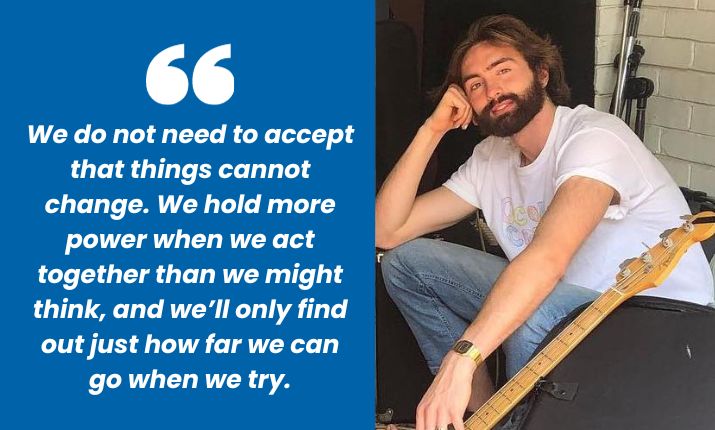My MEAA Story: Jaspar McCahon-Boersma

Jaspar McCahon-Boersma is a bass player from Sydney who has been involved in the Musicians Australia $250 minimum fee campaign.
I’ve been surrounded by music from the moment I was born — both my parents are classical musicians. A completely chance post on a Sydney musicians Facebook page led me to joining the first band I was a part of, who I wrote, recorded, and performed with for a good five years in and around Sydney. I’ve been playing as a bass guitarist in a couple of bands ever since, alongside recording work for friends’ projects — primarily in indie rock, indie folk, and indie soul(ish) worlds.
There are some moments that are seemingly laser-etched into my brain. I vividly remember writing the name of our band on the green-room wall of the Lansdowne, a venue where I had grown up screaming out my lungs to the tunes of my favourite bands. I’m sweaty just thinking of jumping around onstage in a cramped, now-closed record store with four bandmates and 50 friends and strangers for our single launch. The smell of mould is for me apparently now infused with the novel excitement of helping my close friend record the vocals for a French House banger in the crumbling back room of our water-damaged Glebe rental, completely unaware at the time that it would blow up (relatively speaking) two years later. They’re not highlights from selling out a European arena tour, but they don’t have to be!
My experience as musician has been defined by playing music with friends and bands without formal music school education, without a consistent workplace, writing on laptops but then coming together for shows in local venues. In a generation without a strong sense of collective industrial worker consciousness, and in a notoriously atomised industry, the idea of a musicians’ union hadn’t really entered my mind.
In 2019, I organised alongside local bands and my then-FBi-now-triple j-presenter friend Abby to band together and take a form of strike action as part of the climate strikes sweeping the globe. It was such an eye-opening taste of the kind of collective action that seemed missing to me, tying the worker power of musicians with the social aims we believed in.
It was through organising that strike, and seeing how untapped the energised, collective ambitions were of young musicians in my local scene, that I started wondering whether there was a union for musicians. Musicians Australia came along and it was a match made in heaven!
I’ve seen many friends give everything to their music, create such incredible experiences for their audiences, and then — particularly after COVID — stop making music because it just wasn’t viable to live off. I have friends working in the industry, particularly my non-male friends and colleagues, who have been constantly subject to harassment, discrimination, and devaluation of their work.
Musicians are workers. Most of the time we don’t want to think of ourselves as such, but those at the helm of our multi-billion-dollar domestic music industry do when they can use our labour to further their profits.
But just like musicians will rethink, challenge, reimagine, and remake everything in their musical practice, we can do the same thing with the established ‘realities’ of being a musician: being underpaid, being exploited in the workplace, being abused or under-represented. Joining the union is a small but concrete step towards breaking the idea that we can’t change these things. Collective action and solidarity, the foundations of Musicians Australia, are antidotes to enforced resilience — they lay the pathway to together building a creative landscape we can thrive in.
Musicians are workers. Most of the time we don’t want to think of ourselves as such, but best believe that those at the helm of our multi-billion-dollar domestic music industry do when they can use our labour to further their profits. Without our creative labour, the ‘industry’ just doesn’t exist. So if that’s the same dynamic as any other worker in their job faces, the same is true of its solution — workers win dignified pay and dignified conditions for themselves and their colleagues when they fight together in a union. It’s really that simple.
Since joining Musicians Australia, I’ve been a small part of the $250 minimum fee campaign, which has been a hugely energising experience. Speaking to Parliamentarians or giving an interview on live national TV about our demands feel like they should have been the highlights. In reality, it has been the conversations backstage or in the studio about collective action, about being paid properly, about actually how blinding ridiculous it is to have friends paid $3 (!!) for their performances at a major venue while millions are poured out in government grants, that have stuck with me.
At a time of unprecedented focus on cultural policy, with a head-spinning number of peak bodies spruiking ‘industry’ initiatives that clearly left actual working musicians behind, I’m proud to continue to be part of a campaign wrenching the spotlight back onto musicians and what they actually need.
I am not an experienced, decades-long veteran of the music industry. I’m 23. I play in bands with my talented, creative friends at local venues. I record after my rent-paying, non-music work day with my bandmates in bedrooms and in shoe-boxed sized studios with Ableton stock plug-ins and a $200 bass guitar. I belong in the union, because it’s big enough for all of us, and when we win for one, we win for all. And if that’s true for me, it’s true for you.
We do not need to accept that things cannot change. We hold more power when we act together than we might think, and we’ll only find out just how far we can go when we try.